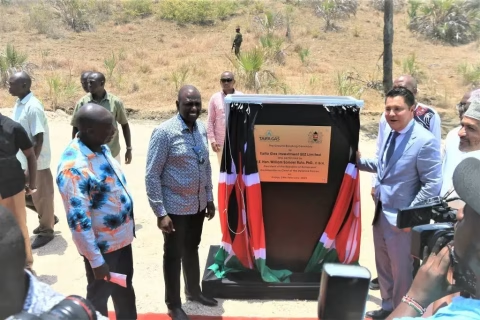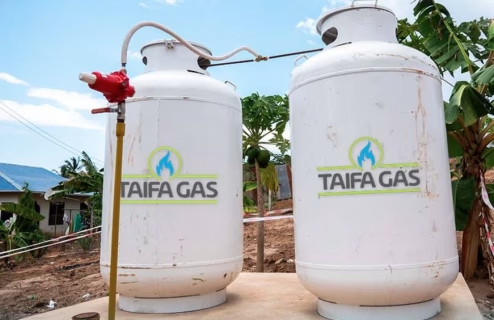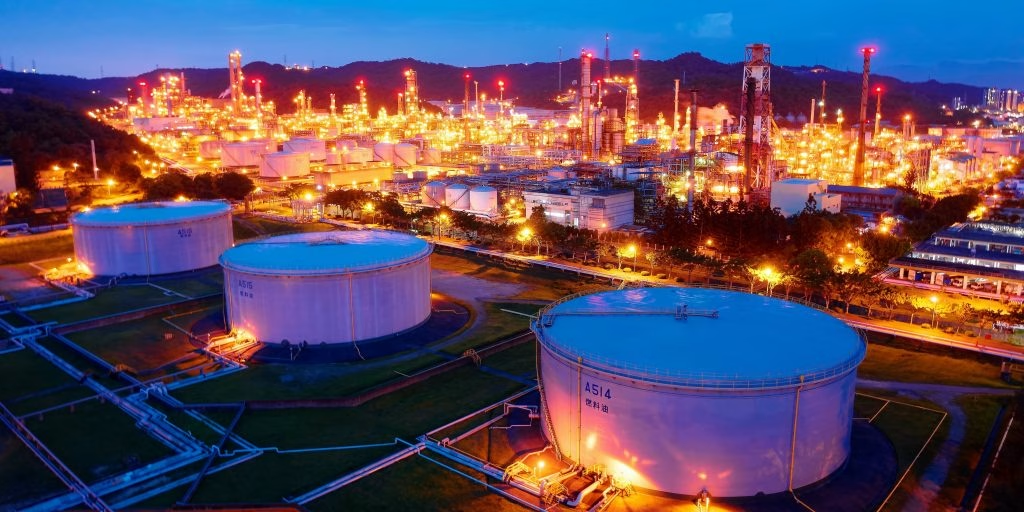Updated November 17, 2025: Taifa Gas Investments SEZ Ltd. got a reprieve after a court struck out a petition challenging construction of the Taifa gas plant. The petition highlighted environmental challenges which hindered construction of the plant at Dongo Kundu SEZ in Mombasa. The Environmental and Land Court struck out the petition issued by two Likoni residents. The petitioners noted that the construction of the 30,000 metric tonnes LPG facility violated various environmental regulations. The court’s decision means that an order temporarily restraining Taifa Gas Investments SEZ Ltd from carrying out construction activities in relation to the LPG project now lapses.
“The finding that the respondent’s (company’s) preliminary objection on the ground of res judicata is upheld, suffices to determine the petition and application,” ruled the court. Furthermore, ELC ruled that petitioners had not presented any documentary evidence to counter that presented by the respondent on the licensing processes undertaken and approvals obtained.

The petitioners wanted a declaration that activities by Taifa Gas Investments SEZ Ltd were unauthorized and illegal. These includes construction as well as felling and destruction of indigenous trees. Furthermore, excavation or proposed commencement of works to set up the LPG terminus without prior notice to consent to be deemed illegal. Also, consultation or compensation to them and compliance with mandatory provisions of the law. With these charges out the window, the Tanzania-based company has the go-ahead to commence construction of Africa’s largest LPG facility. Special economic zones are expected to be a game changer with projects such as the Vipingo SEZ also taking shape.
September 25, 2025: Construction of the $125 million Taifa gas plant in Mombasa is facing major setback as client company moves to the Court of Appeal. Taifa Gas Investments SEZ Ltd is seeking to overturn the ruling by the Environment and Land Court that is halting the project’s implementation. The plant that is expected to be constructed in Dongo Kundu aims to get past this hurdle as it appeals on the suspension. The company is associated with Tanzania’s billionaire businessman Rostam Aziz. Their aim in appealing is to have the Court of Appeal entirely set aside the orders and directions of the Environment and Land Court (ELC).
Earlier last week, the company appeared before the ELC noting that the injuction may have resulted in losses for the company. However, their plea was rejected as the judge noted that the damage to the environment may be great if work continues. Taifa Gas had sought the setting aside of execution of the order pending hearing and determination of its application. Companies are seeking to venture their investments in the country’s various special economic zones with the Vipingo Special Economic Zone being one of the few that is taking shape.
Project Factsheet
Significance:
- $124 million project aimed at boosting Kenya’s LPG supply chain.
- Planned facility in Dongo Kundu would enhance accessibility, reduce costs, and expand Taifa Gas’s market presence.
- Represents a major step for Tanzania’s Taifa Gas Investments in entering the Kenyan market.
Infrastructure:
- LPG gas plant designed for large-scale storage, processing, and distribution.
- Includes planned construction of a pipeline linking the facility to distribution points.
- Expected to strengthen Kenya’s domestic LPG infrastructure and reduce import reliance.
Developer/Consortium:
- Developed by Taifa Gas Investments SEZ Ltd, associated with Tanzanian billionaire Rostam Aziz.
- Regulatory oversight involves Kenya’s National Environmental Management Authority (NEMA).
- Legal matters currently under review by Kenya’s judiciary.
Funding/Timeline:
- Project cost estimated at $124 million.
- Construction timeline delayed due to legal challenges.
- Implementation now depends on the outcome of the Court of Appeal ruling.
Challenges:
- Halted by an Environment and Land Court injunction over environmental concerns.
- Pipeline construction may disturb sediments, reduce water quality, and harm ecosystems.
- Potential impacts on local fishing grounds and community livelihoods.
- Petitioners also seek compensation for alleged damage to vegetation, trees, and excavation.
Challenges Facing the Construction of the Taifa Gas Plant in Mombasa
According to opposition on the implementation of the Taifa gas plant, they note that the project will have tremendous environmental effects. For instance, the construction of a planned pipeline will lead to the suspension of sediments that will ruin water quality. Moreover, they assert that this will also affect the penetration of light for the ecosystem within the water. They also argue that the livelihoods of local people may be affected as the pipeline will ruin fishing grounds. The petitioners have also named the National Environmental Management Authority (Nema) as an interested party in the case.

As the matter moves to the Court of Appeal, they are hoping that the conservatory order of injunction will be issued to the company. They are also seeking compensation from Taifa Gas Investment SEZ Ltd for the destruction of the environment, indigenous trees and vegetation, and excavation works in violation of the law. The gas plant, once completed, was hoping to bolster production as it sought to enter the Kenyan market. Though there are supplies, a local-based gas plant would make accessibility to customers and mobility more viable. Through this, the company aims to cut costs and be closer to their clients in the country and expand their market.

Leave a Reply